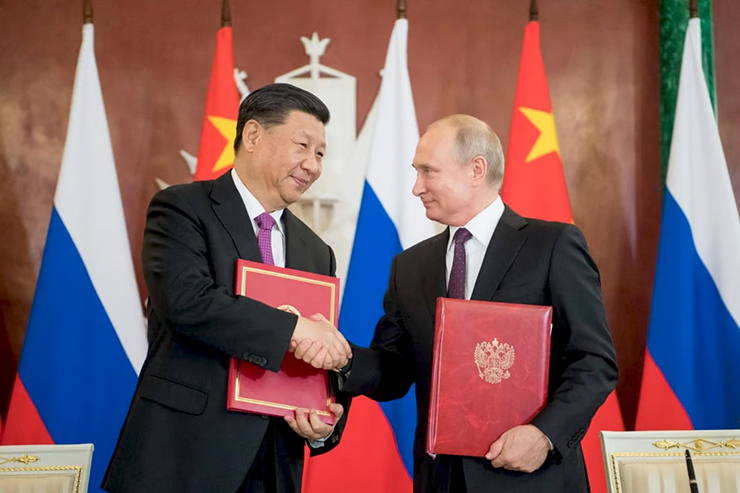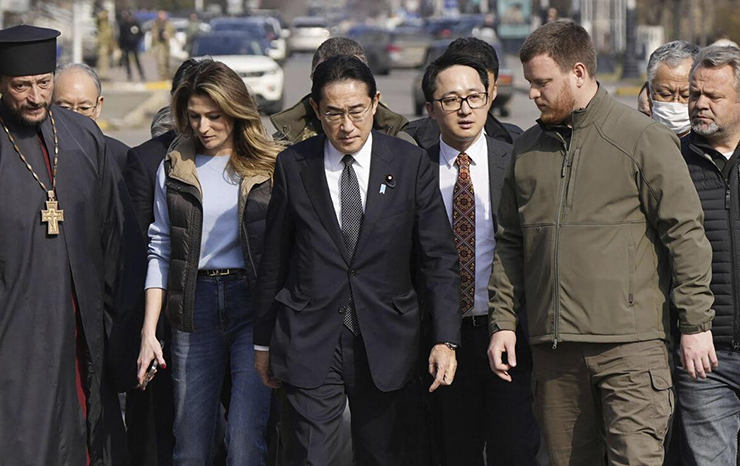
President Xi Jinping returned to China on Wednesday after completing a much hyped three-day visit to Russia, but then without any clarity whether his visit to Moscow, called a ‘journey of peace’ remained successful in its mission or not. Because, Russia continued its attack against Ukraine even as Chinese President Xi Jinping and Russian President Vladimir Putin were signing on a Joint Statement that was hollow on the roadmap to the Ukraine war but full of praise on growing China-Russia relations.
On the other hand, a different game was played out in Kiev by Japanese Prime Minister Fumio Kishida who made a surprise visit to Ukraine to show solidarity with the war-ravaged country. While it reminded the world about increasing complexity of the geopolitical situation, Kishida’s visit to Ukraine, as per the Japan Times, was the first by a Japanese Prime Minister to an active war zone in nearly half a century.
Both symbolism and substance were on full display in Kishida’s visit to Ukraine, first by an Asian leader. He discussed strategy and means to drive Russia out of illegally annexed territories and pledged support for Ukraine’s post war reconstruction. President Xi Jinping in Moscow pledged Beijing’s commitment to advance “China-Russia comprehensive strategic partnership of coordination for a new era.”
For international experts, Xi Jinping’s meeting with Putin, a day after the International Court of Justice issued an arrest warrant against the Russian President for war crimes, reflected in a sense, the Chinese President’s move to stand in solidarity with the Russian strongman. This seems to have sent the wrong message to the US and its allies who see growing bonhomie between President Xi and President Putin as factors of instability and insecurity in the world.
The Japan-Ukraine Joint Statement issued after Prime Minister Kishida and Ukrainian President Volodymyr Zelenskyy’s meeting that lasted approximately two hours and 45 minutes in Kiev on March 21, broadly reflected such concerns.
“The leaders expressed serious concern about the situation in the East and South China Seas, and strongly opposed any unilateral attempt to change the status quo by force or coercion. The leaders also emphasized the importance of peace and stability across the Taiwan Strait as an indispensable element in security and prosperity in the international community”, read the Japan-Ukraine Joint Statement.
In his Joint Statement with Zelenskyy, as per The Japan Times, Prime Minister Kishida did not single out China by name, but “repeatedly linked the Ukraine war to Asia,” noting “the inseparability of Euro-Atlantic and Indo-Pacific security” and calling the conflict as “a direct threat to security, peace and stability not only in the Euro-Atlantic area but also in the Indo-Pacific region and beyond.”
Overall impression gained from Xi Jinping’s visit to Moscow has been that the Chinese leader was very much concerned about boosting bilateral trade with Russia in energy and mineral resources and in enhancing the resilience of China-Russia industrial and supply chains, then dousing the flames of fire that has engulfed Ukraine for more than one year.
“The two heads of state agreed that the two sides need to strengthen overall design and top-level planning, boost trade in energy, resources, and electromechanical products, enhance the resilience of their industrial and supply chains, expand cooperation in such areas as information technology, the digital economy, agriculture and trade in services, promote greater complementarity and joint development of traditional trade and emerging areas of cooperation, and further facilitate cross-border logistics and transportation,” China’s Foreign Ministry Spokesperson Wang Wenbin said in response to a media query on President Xi Jinping’s visit to Russia.
However, the China-Russia Joint Statement is missing on the proposed Power of Siberia 2pipeline. Reuters said the China-Russia summit “produced 14 agreements from soybeans to atomic energy, but it did not yield the big prize Russia wants: a deal on a new gas pipeline, Power of Siberia2, to pump an extra 50 billion cubic metres of Russian gas annually to China via Mongolia.”
Of course, these were matters directly relevant to China’s interests and President Xi Jinping used all available opportunities during his three-day visit to Russia to dwell on bilateral engagements without deviating from his objective to consolidate Beijing’s relations with Moscow.

In his more than 1800 words article for the Russian Gazette, which was written a day before his visit to Moscow, Xi Jinping had hinted categorically that bilateral relations and bilateral trade would be the focus of his summit with President Putin. In fact, in the Russian Gazette, word ‘Ukraine’ featured three times even while XI “devoted much more space to eulogizing bilateral relations and that bilateral trade soared to $190 billion last year,” Time said in its news portal edition on March 20.
Experts say China wants to consolidate its ties with Russia because it is the only big strategic power that is a permanent member of the United Nations Security Council and also shares prickly ties with the US and its allies. At the time when Beijing is aiming to forcibly unify Taiwan with mainland China, President Xi will see that Russia sides with it during a possible conflict with the US.
According to US Central Intelligence Agency Director William Burns, Chinese President Xi Jinping has instructed the People’s Liberation Army to be ready by 2027 to invade Taiwan. Upping the ante against Taiwan, China has enhanced its hostilities against the self-ruling island. While continuing with military aggression against Taiwan by often sending warplanes to the self-ruling island’s air defence zone, China has adopted every trick in the book to harass the island which lies about 100 miles (161 km) east of mainland China.
However, through his Ukraine visit, the Japanese Prime Minister won the hearts of beleaguered Ukrainians. It also sent a strong message to both China and Russia that Tokyo not only follows a checkbook diplomacy (Japan has agreed to provide $470 million assistance for Ukraine’s energy sector and other industries), but also challenges those who violate rules-based global order and disrupt peace and security in the world. Japan also provided money to Ukraine for the purchase of non-lethal arms.
Overall, the Ukraine visit by Kishida was full of imagery as it demonstrated Japan’s evolving leadership on the world stage. But the question is: How far Japan will go to show that successors of ex-Prime Minister Shinzo Abe who had conceptualised his country’s Indo-Pacific vision by playing a seminal role in the formation of Quad in 2007, would remain committed to becoming the leading voice of the world? Under Prime Minister Kishida, Japan in January unveiled a massive $315 billion defence budget and National Security Strategy (NSS) which guides the country to move past its pacifist policy by possessing “counterstrike” capability.
–The writer is a senior journalist with wide experience in covering international affairs. The views expressed are of the writer and do not necessarily reflect the views of Raksha Anirveda








